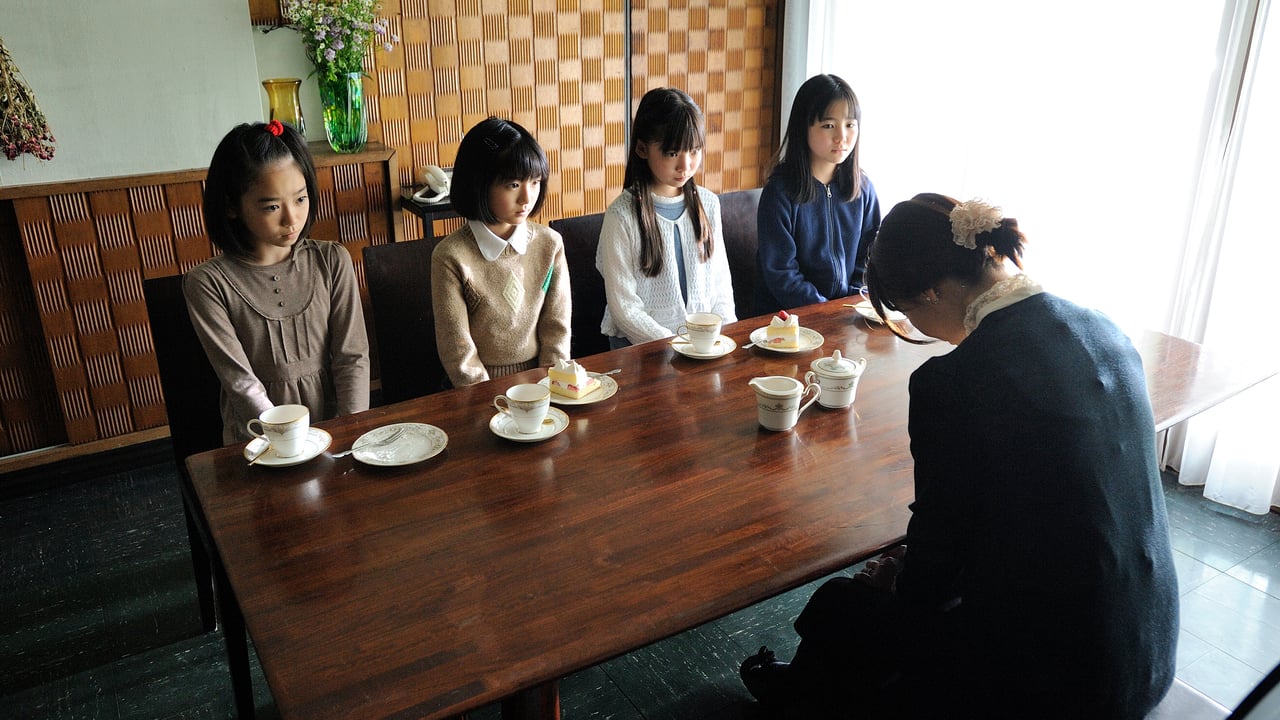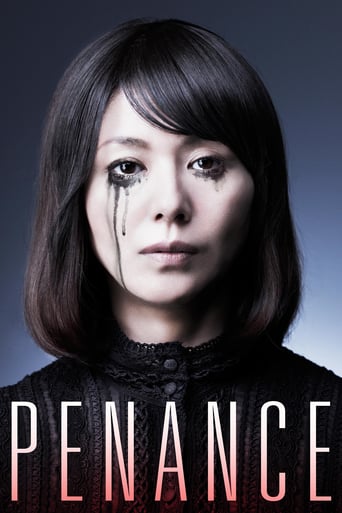



That was an excellent one.
Such a frustrating disappointment
a film so unique, intoxicating and bizarre that it not only demands another viewing, but is also forgivable as a satirical comedy where the jokes eventually take the back seat.
View MoreOne of the film's great tricks is that, for a time, you think it will go down a rabbit hole of unrealistic glorification.
View MoreI'm a huge Kiyoshi Kurosawa fan. I find that he and my other favorite director, John Carpenter, really know how to use well space and eerie tone to maximize the dread and atmosphere. This is clearly a low budget drama series and Kurosawa does what he can with the budget (and ample space!). There are definitely key scenes and overarching sense of dread that Kurosawa fans have grown accustomed to. I have no problem with the direction but the plot...!I've read the book and really loved it. I was curious to see how the book got adapted into the film and let me tell you, it seriously doesn't make any sense! Of course, when adapting a novel, there will be many changes made to make it work on the screen. However, the changes they made are incomprehensible, especially the second story. The conclusion to that story was simply unnecessary and seeing characters take abuse for no reason makes viewers feel annoyed. The plot leaves out so many details that were in the book that it seriously doesn't make any sense whatsoever. For example, the first story doesn't even bother why they had French dolls decorated in the house. Therefore, it was bizarre when the protagonist of that story suddenly says that they had a French doll displayed in the house. The ending came out of nowhere and didn't make sense; it doesn't not fit with the theme of "penance". The series doesn't really do a great job explaining how much the even that took place 15 years ago affected these girls. Asako's character was changed greatly to the point that it wouldn't fit the big revelation. I guess it won't be much of a spoiler since things changed but the book does make it clear that Asako is a selfish thoughtless woman and the entire event happened because of her. I felt a great catharsis when Yuka tells off Asako but that was lost in this series. The fact that Asako stopped being the selfish nightmare in this adaptation really made the final revelation not work and also shows how much the screenwriters didn't understand the original source.
View More"Shokuzai" first appears to have everything a Kurosawa fan would hope for, yet fails miserably to hold any lasting emotional or intellectual value due to extremely poor and formulaic writing.As a study in film making, I would rate it at least 8/10 for something so low budget. The camera shots bring me back to the early Kurosawa days, slow and contemplative so much as to make any fan rejoice. Kurosawa's usage of sound and odd atmospheric background tracks are another stand out trademark of his that no fan will fail to appreciate in "Shokuzai". The first couple of episodes are such a treat in this sense that it's easy to miss what blunders the story suffers at first.The core problem with "Shokuzai" is with it's writing, where character actions and convictions are vastly unconvincing, and the problems they suffer are so obviously curable it makes you nearly scream. "Shokuzai" treats childish and illogically perceived problems as absolute truths with no answer, then expects the viewer to feel sorry for it's characters who we are supposed helpless victims. The characters fail to use any kind of logic, and the entire script bleeds of missed conversational opportunities. Worse is the repeated idea of one's "shokuzai" or "atonement" that every character is obsessed with, so much that one is locked up in a mental ward while another commits murder. Whether or not the book does a better job of showing us why this "shokuzai" is such an important part of these girl's lives is unknown to me, but these episodes take something that seems almost trivial, and tries to make it out as the main plot device.Indeed, the problems that the characters face in "Shokuzai" would never be relevant on TV or in a novel outside of Japan. However, the idea that all Japanese enjoy this kind of story telling, or that the issues the characters suffer from are always real problems in Japan is simply untrue. Creating characters who are overcome by grand ideas, repeating illogical one liners, and plagued by overly conceptual thinking is pretentious and boring. It is never well received, and never critically acclaimed even in Japan. As even Kurosawa's earlier films suggest, there is a home for logic and free thinking in Japan, transcendent of stereotyping and cultural boundaries, "Shokuzai" however, is not it. Here we have a series that is a massive step backwards in story telling, handled "well" by a director who is capable of much more.
View More"Shokuzai", in my opinion, deserves 8/10, as a TV series, but if we consider these episodes as separated units, because they are more or less accomplished little films, I'll give them lower values. I think, besides first episode titled "French Doll" anyone else of next four episodes wouldn't be Kiyoshi Kurosawa's favorite for individual distribution as a movie. Simply, with this TV series Kiyoshi didn't achieve quality of his previous TV projects - "Seance" and "House of Bugs".Don't get me wrong. This Kiyoshi's work also is, without any doubts, surgically precisely shot and directed, well-written and well-acted, but he didn't build up it's own reality, virtual reality, which every artwork have to contain in order to persuade the audience, that this screen's reality is more "reliable" than real world. Artistic reality doesn't imply mere reflection of our everyday lives, which is, sometimes, exciting and upsetting, but otherwise prosaic. In fact, it implies surrealism, vividness, using symbols, metaphors, allegory, phantasmagory, everything we could have found in the best Kiyoshi's movies, such as "Pulse", "Charisma", "Loft", "Cure", "Bright Future" etc.K.Kurosawa is one of my favorite directors, therefore my expectations were too high, although this project obviously wasn't conceived as an artwork but mass consumption TV product. In the end, I hope that his next projects will be made for theatre, not for TV.
View MoreWell, we finally get to see something from Kiyoshi Kurosawa. Here's an introduction from the J-Film-Pow-Wow website: "It was only a few days ago that I was looking at my DVD shelf and my eyes stopped on Kiyoshi Kurosawa's "Tokyo Sonata" (2008). I remember when that film had its North American premiere at the Toronto International Film Festival and critics were hailing it as one of Kurosawa's masterpieces. Then . . . nothing. Kurosawa continued to teach at Tokyo's University of the Arts' Film School, but no new projects from him came to light. Well, that's about to change, although maybe not for us here in North America, at least not yet. Let me explain.According to Tokyograph Kurosawa has directed a series based on the work of novelist Kanae Minato. Minato's name doesn't ring a bell? It should. Tetsuya Nakashima's "Confessions" was based on Minato's 2008 novel of the same name. Due to the success of that adaptation Kurosawa was brought in by the folks at WOWOW to not only direct but also write the screenplay for a screen adaptation of Mintao's 2009 novel "Shokuzai." "Shokuzai" tells a story eerily similar to "Confessions" in which a mother blames four students for not being able to identify the murderer of her daughter 15 years before. The story is also eerie enough to put in the hands of Kurosawa, that man who brought us such landmark J-Horror films as "Cure" and "Pulse." The biggest problem for Kurosawa fans is that WOWOW will be broadcasting "Shokuzai" on Japanese TV in January. There is no word at all if the film will see a DVD release anytime in North America, but given that Kurosawa's 2000 film "Séance" was a made-for-TV project there is hope that we'll eventually get to see "Shokuzai." My Review In One Breath: Kiyoshi Kurosawa returns in top form with this television mini-series (5 episodes, 50-75 minutes each). 15 years after a little girl is raped and murdered, her mother and four of her childhood friends deal with the emotional consequences. Each episode focuses on one character at a time, which gives the actresses ample screen time to make their contributions. And let me tell you, there is some serious acting talent on display here: Kyoko Koizumi ("Tokyo Sonata"), Yu Aoi ("Don't Laugh At My Romance"), Eiko Koike ("2LDK"), Sakura Ando ("Love Exposure"), and Chizuru Ikewaki ("Oishi Man") all have significant roles. As expected from this director, the camera-work is outstanding, there is heavy emphasis on psychology, and subtle character mannerisms are expertly utilized to create suspicion and uncertainty.There are three other things to keep in mind regarding "Shokuzai." 1. This series fits comfortably within the "drama" genre, not the "horror" genre. 2. The characters are developed very well. 3. This not a tale of revenge. The mother of the victim refuses to forgive the girls (now grown up) for not being able to identify the murderer, but she does not seek vengeance. The plot basically shows how the women were psychologically affected by the traumatic incident in their childhood.Strongly recommended for fans of Kiyoshi.
View More